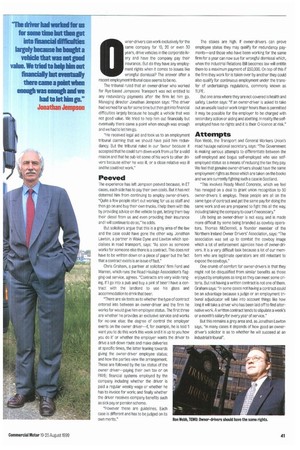"The driver had worked for us for some time hut
Page 43

If you've noticed an error in this article please click here to report it so we can fix it.
then get kite financial ifficeldes largely because he hsnOt a vehicle that was net geed vahw. We tried te help hie out fumed* hut events* there came a point when enough was am. and we had to ge: Jonathan Jempson
Owner-drivers can work exclusively for the same company for 10, 20 or even 30 years, drive vehicles in the corporate livery and have the company pay their insurance. But do they have any employment rights when it comes to issues like wrongful dismissal? The answer after a recent employment tribunal case seems to be no.
The tribunal ruled that an owner-driver who worked for Rye-based Jempsons Transport was not entitled to any redundancy payments after the firm let him go. Managing director Jonathan Jempson says: "The driver had worked for us for some time but then got into financial difficulties largely because he bought a vehicle that was not good value. We tried to help him out financially but eventually there came a point when enough was enough and we had to let him go.
"He received legal aid and took us to an employment tribunal claiming that we should have paid him redundancy. But the tribunal ruled in our favour because it accepted that he could turn down work from us for a valid reason and that he sub-let some of his work to other drivers because either he was ill, or a close relative was ill and he could not work."
Peeved
the experience has left Jempson peeved because, in ET cases, each side has to pay their own costs. But it has not deterred him from continuing to employ owner-drivers. "Quite a few people start out working for us as staff and then go on and buy their own trucks, I help them with this by providing advice on the vehicle to get, letting them buy their diesel from us and even providing their insurance and I will continue to do so," he adds.
But solicitors argue that this is a grey area of the law and the case could have gone the other way. Jonathan Lawton, a partner in Wake Dyne and Lawton whch specialises in road transport, says: "As soon as someone works for someone else there is a contract. This does not have to be written down on a piece of paper but the fact that a contract exists is an issue affect."
Chris Graham, a partner at solicitors' firm Ford and Warren, which runs the Road Haulage Association's flagging-out service, agrees. "Contracts are very wide ranging. If I go into a pub and buy a pint of beer I have a contract with the landlord to use his glass and accommodation to drink that beer.
"However these are guidelines. Each case is different and has to be judged on its own merits." The stakes are high. If owner-drivers can prove employee status they may qualify for redundancy payments—and those who have been working for the same firm for a year can now sue for wrongful dismissal which, when the Industrial Relations Bill becomes Law will entitle them to a maximum payment of 150,000. On top of this if the firm they work for is taken over by another they could also qualify for continuous employment under the transfer of undertakings regulations, commonly known as TUPE.
But one area where they are not covered is health and safety. Lawton says: "If an owner-driver is asked to take out an unsafe load or work longer hours than is permitted it may be possible for the employer to be charged with secondary action or aiding and abetting. In reality the selfemployed have no rights and it is their 0-licence at risk."
Attempts
Ron Webb, the Transport and General Workers Union's road haulage national secretary, says: "The Government is making serious attempts to differentiate between the self-employed and bogus self-employed who use selfemployed status as a means of reducing the tax they pay. We feel that genuine owner-drivers should have the same employment rights as those which are taken on the books and we are currently fighting such a case in Scotland.
"This involves Ready Mixed Concrete, which we feel has reneged on a deal to grant union recognition to 50 owner-drivers it employs. These people are all on the same type of contract and get the same pay for doing the same work and we are prepared to fight this all the way, including taking the company to court if necessary."
Life being an owner-driver is not easy, and is made more difficult by some being branded as cowboy operators. Thomas McDonnell, a founder member of the Northern Ireland Owner Drivers' Association, says: 'The association was set up to combat the cowboy image which a lot of enforcement agencies have of owner-drivers. It is a very difficult task because a lot of our members who are legitimate operators are still reluctant to expose the cowboys."
One crumb of comfort for owner-drivers is that they might not be disqualified from similar benefits as those enjoyed by employees as long as they can meet some criteria, But not having a written contract is not one of them. Graham says: "In some cases not having a contract could be an advantage because a judge or an employment tribunal adjudicator will take into account things like how long it will take a driver who has been laid off to find alternative work. A written contract tends to stipulate a week's or a month's salary for every year of service."
But this remains a grey area and, as Jonathan Lawton says, "in many cases it depends of how good an ownerdriver's solicitor is as to whether he will succeed at an industrial tribunal".








































































































